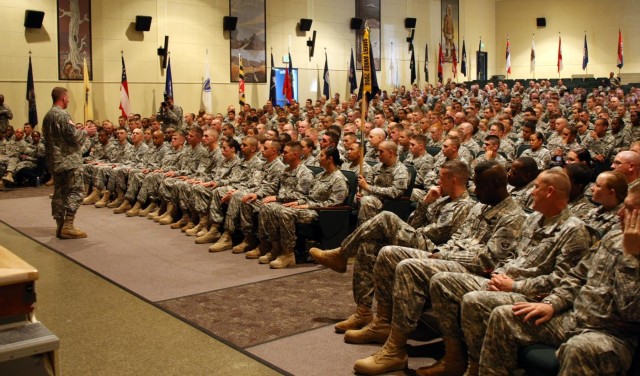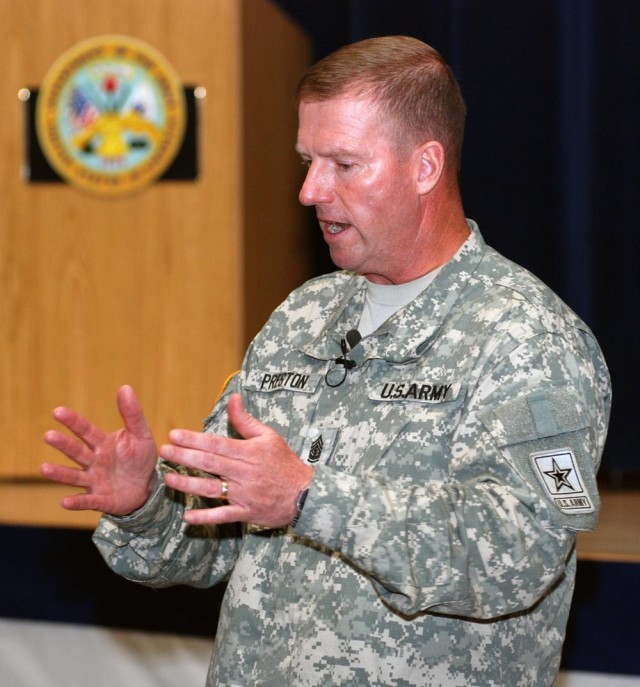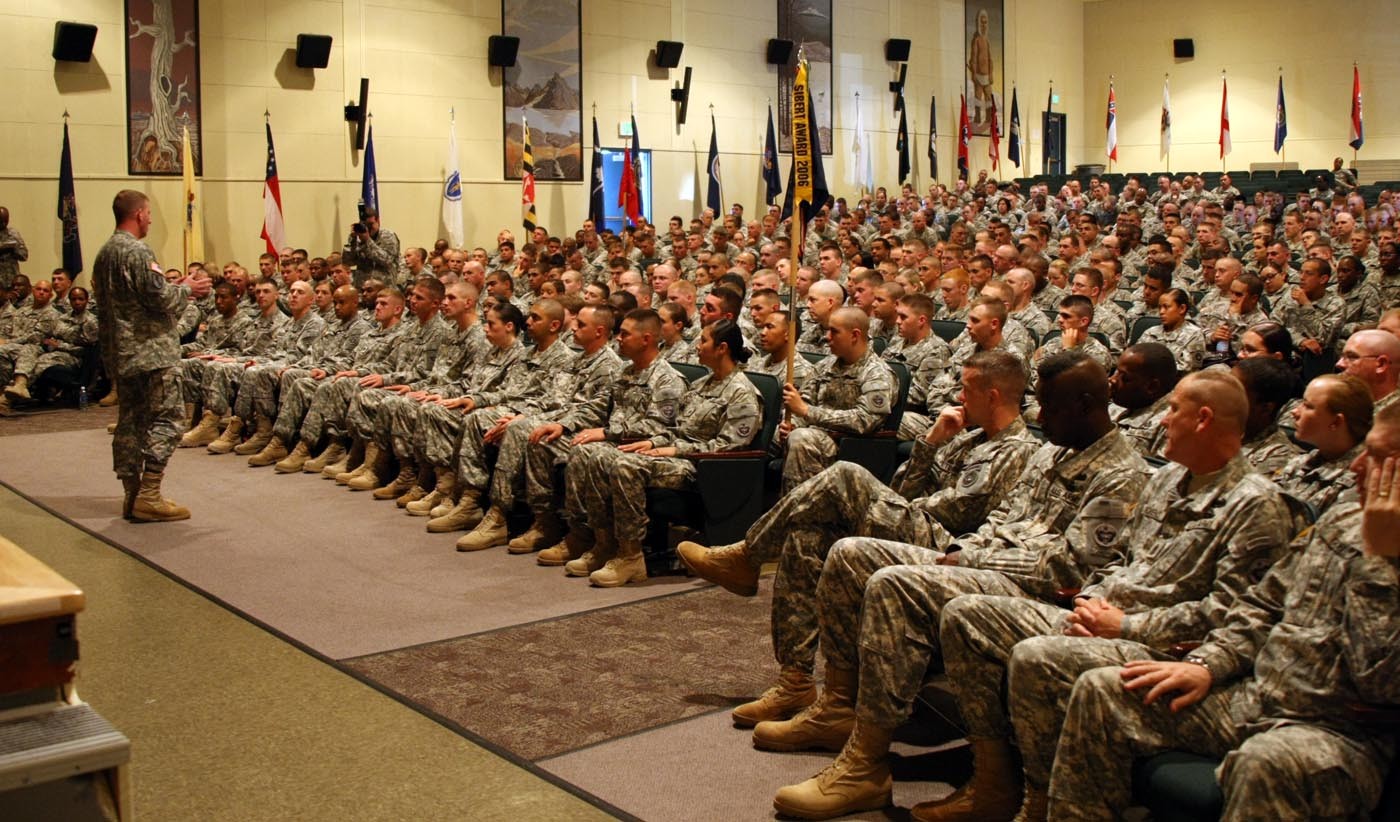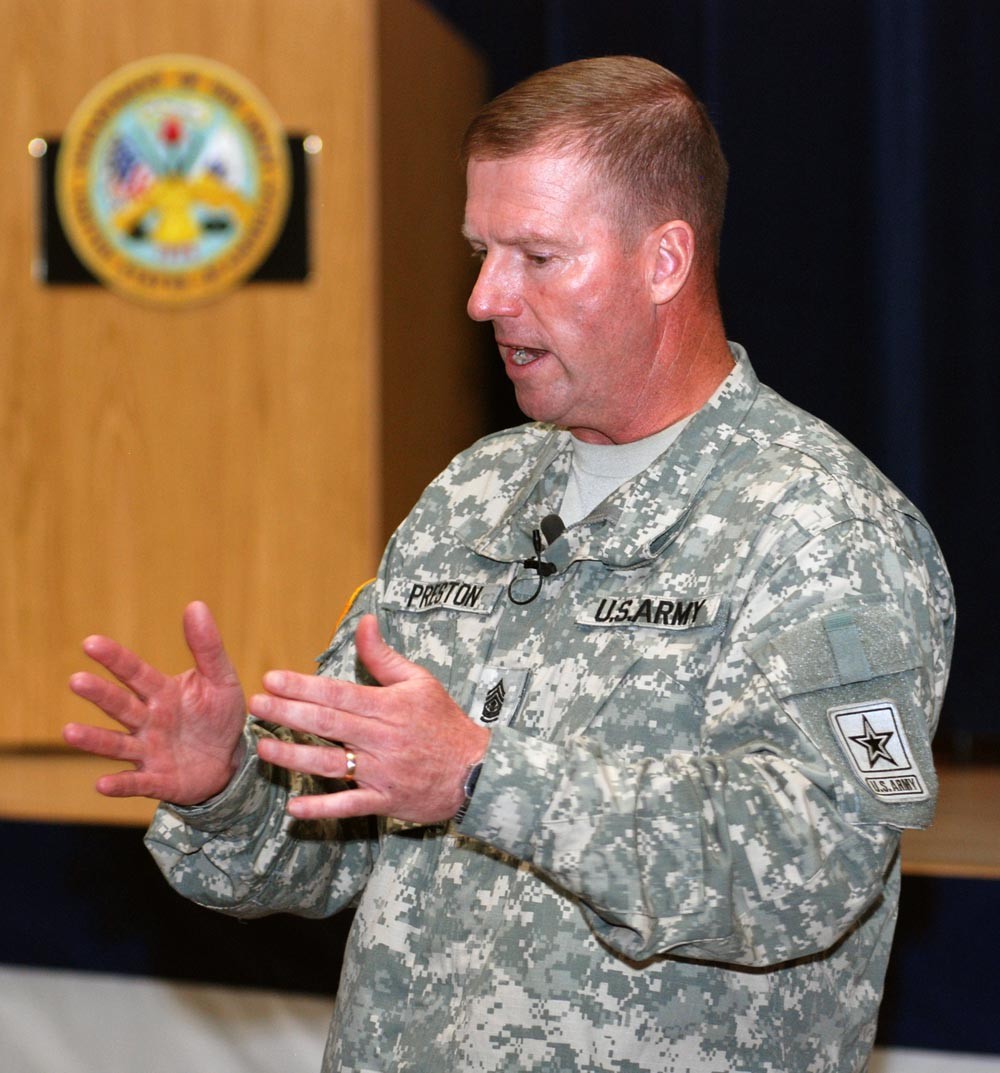FORT RICHARDSON, Alaska -- The Army's top enlisted leader addressed topics such as deployment tour lengths, dwell time and changes to noncommissioned officer training in the Year of the NCO during a town hall forum here, July 7.
Before opening the forum, Sgt. Maj. of the Army Kenneth O. Preston headlined a noncommissioned officer induction ceremony formally initiating a group of U.S. Army Alaska's newest corporals and sergeants into the NCO corps.
Preston emphasized the importance of the NCO's charge to accomplish the mission and ensure the welfare of Soldiers in an increasingly busy and complex Army.
"Today, with 258,000 Soldiers deployed in 80 countries around the world, it's no secret that we're a little bit busy and there's a lot of moving pieces out there," Preston said. "Most importantly, train your Soldiers, so that no Soldier goes into harm's way untrained."
Town hall forum
Much of what Preston told the audience in opening remarks stemmed from a meeting with President Barack Obama in the Oval Office earlier this year, he said.
The president called a Jan. 30 meeting with the service senior enlisted advisors because he wanted to hear "the unvarnished truth" about issues affecting enlisted servicemembers, according to Preston.
"We were asked to submit our top three to five issues that we wanted to talk about with the president," he said. "The things I submitted were: I wanted to talk about stress on the force; I wanted to talk about recruiting and retention; and I wanted to talk about the Year of the NCO."
"We talked about 12- and 15-months [deployments]. I told the President that when you're over there it's seven days a week and long duty hours for 12 to 15 months. Somewhere in there you get 15 days of block leave and then you're back at it again. It's stressful, too, coming back when you're a unit that only has 12 months of dwell time or so, and then you go back again on another deployment."
Preston said dwell time can also be a trying period as Soldiers, families and units readjusting to normality and preparing to deploy again.
He said the whole Army feels the burn of a high operational tempo.
"It's not just the operational Army, it's also the institutional Army that's got a high degree of stress," Preston said, citing drill sergeant, training cadre and recruiting assignments as examples of high stress occupations some might wrongfully characterize as respite, or "taking a knee" from the deployment cycle.
"I wanted the president to understand that the Army's very busy and there's a lot of stress on Soldiers," Preston said. "Whether it's the operational Army or the institutional Army, there is no 'taking-a-knee' kind of position anymore. We've taken all of the slack out of the system."
The Army's high operational tempo can be just as stressful on families, Preston said.
"You take a family and pack them up and move them every three or four years, taking kids out of school and putting them in a new school - that's stressful," he said.
Preston noted that Alaska governor Sarah Palin's recent signing of the Interstate Compact on Opportunities for Military Children will help ease education transition for military children and their families as they move to and from assignments in Alaska.
The compact is an agreement between states to standardize educational credits for military children moving from state to state. Preston said the Department of Defense aims to eventually make all states part of the compact.
"This way, when a child leaves Alaska or Hawaii and goes to Texas, a military child in their junior year going into their senior year won't have to [for example] go to summer school to take Texas state history so they have enough credits in order to graduate from school," Preston said.
Despite the high operational tempo and the many challenges of Army life, Preston said, many Soldiers and families are opting to stay in service, and do so out of a sense of duty and loyalty.
"Soldiers and families would not continue to reenlist and continue to stay with the team if they didn't believe in what they were doing and they didn't believe in the missions that they were doing, didn't want to continue to part of something bigger than themselves and didn't want to continue to be part of that band of brothers and sisters," Preston said.
The Army has reached its end-strength goal for the active-duty Army two years ahead of schedule, he noted. He attributed that achievement both to the efforts of recruiters and to the overwhelming number of Soldiers reenlisting.
NCOES changes
A number of changes to the noncommissioned officer education system will happen this year, Preston said.
"We want to enhance the capabilities of the noncommissioned officer corps," Preston said. "There's a lot of things we're doing for civilian education as well as professional military education. We will complete transformation in a lot of areas this year," Preston said.
Among the coming changes to the NCO education system:
- The Warrior Leader Course will place more emphasis on leadership training, less on warrior tasks and battle drills.
- Privates first class will be able to attend the Warrior Leader Course, acknowledging that many already serve in leadership positions, such as team leaders and squad leaders.
- The Basic NCO Course will become the Advanced Leaders Course.
- The Advanced NCO Course will become the Senior Leaders Course.
Those changes, Preston said, are intended to give NCOs "the right education sooner in their career," and focus on leadership, while handing back the responsibility for training on warrior tasks and battle drills to units, "where they belong," he said.
Changes are also in the works to enhance civilian education opportunities for Soldiers and NCOs, Preston said, pointing to recent discussions between the Army and universities to allow Army courses to be translated into college credits.




Social Sharing